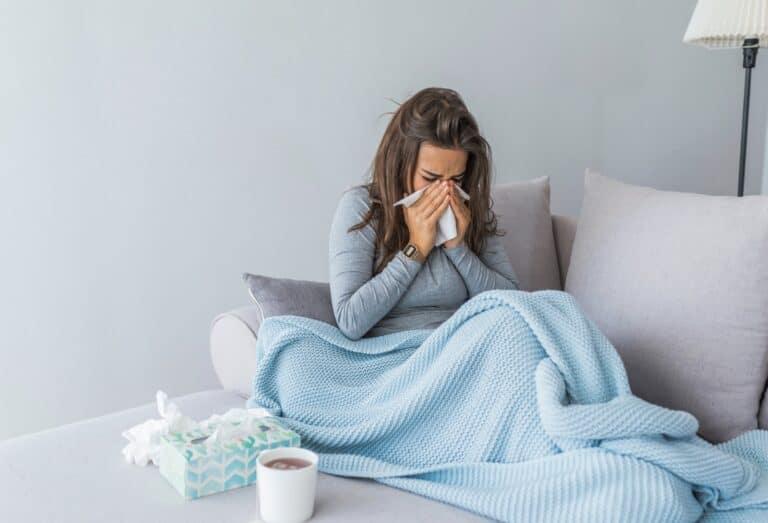

December 22, 2025 (Current Version)
March 28, 2025
Flu (influenza) is a common infectious viral illness spread by coughs and sneezes and close contact. You can catch flu all year round, but it’s especially common in winter, which is why it’s also known as seasonal flu. Flu isn’t the same as the common cold. Flu is caused by a different group of viruses, the symptoms tend to start more suddenly, be more severe and last longer.
Common flu symptoms are a high temperature (fever) of 38C or above, feeling tired and weak, headaches, general body aches and pains and a dry, chesty cough. Cold-like symptoms, such as a blocked or runny nose, sneezing, and a sore throat, can also be caused by flu, but these tend to be less severe than the other symptoms you have.
Good health habits, like avoiding people who are sick, covering your mouth when coughing and washing your hands often can help stop the spread of germs and prevent respiratory illnesses like flu. Antiviral drugs can also be used to treat and prevent flu. So, how best to swerve the flu this flu season. Here’s a list of tips to keep you ahead of the game.
1. Eat well
The cold weather can make us want to comfort eat, especially junk food. But try to avoid fatty, unhealthy food. Instead, opt for a healthy well-balanced diet, such as fruit and veggies, potatoes, whole grain bread, rice and pasta, other carbohydrates, or foods with a good mix of healthy fats and proteins, such as chicken, fish, beans and pulses.
2. Exercise
Yoga, spinning, a run, or a HIIT class will all get your heart rate up, your blood flowing, boost your mood and your energy levels, even if it is for just a short period. You may not feel like doing physical activity, but even a 15-minute brisk walk can get your heart rate going.
Exercise helps to make your immune system work better against infections. Aim for at least 30 mins of exercise, three times a week to keep your body in the best condition.
3. Wear a scarf
What may be surprising to you is that an everyday winter accessory such as a scarf could do a lot to protect you from colds and flu during the flu season. Wearing a scarf helps a little to prevent inhaling contagious germs from other people coughing or sneezing.
4. Don’t bite your nails
Your nails are a breeding ground for germs, so the more you nibble, the more chance you have of developing an infection or the flu. Washing your hands regularly will also help prevent you from picking up nasty bugs.
5. Wash your hands
Wash your hands, especially after eating and using the toilet. Public toilets these days give directions on how to clean your hands correctly. A good clean with soap will take about 20 seconds and is always the best. Carry a hand sanitiser. These are especially useful when you are out in public, on public transport or at work (Tip – keyboards are riddled with germs!).
Another healthy habit is to cover your mouth and nose with a tissue when coughing or sneezing. It will help prevent the spread of the flu and protect those around you from getting sick.
6. Stop stressing
Easier said than done, especially during the silly season. Stress has a huge impact on your body and can play its role in making you more susceptible to getting ill.
If you’re feeling stressed look at taking up meditation, yoga, or tai chi or find activities that make you feel relaxed and improve your mental health. Listening to relaxing music, having technology-free breaks (especially from social media), taking a bubble bath or just introducing periods of time just for you to be.
7. Get 8 hours sleep
A lack of sleep can weaken your immune system, making you more vulnerable to illness. Getting enough sleep is one of the best and most natural ways to feel fully energised, boost energy and overall health. Try to get at least 7/8 hours of sleep per night. Get to bed at least an hour earlier than usual for a week or more. Try and relax before you go to bed and don’t look at mobile devices for at least an hour before, as the blue light stimulates the brain and can affect the quality of sleep you have. So, make sure you go to bed early, you’ll wake up feeling refreshed and ready to take on the day. If you can’t get at least eight hours, try fitting in a power nap or two during the day. You’ll feel more rested if you do.
8. Cut down on your booze
The more you drink the weaker your immune system becomes, this is when colds and flu will attack. Alcohol helps many people to relax and fall asleep, but you will sleep less deeply when you’ve had a drink, so even if you get 8 hours of sleep it may not be “quality sleep” and this can again impact your immune system. Try to limit your weekly alcohol intake and stick to the recommended units per week.
9. Get your flu jab
The single best way to reduce your chances of getting seasonal influenza is to get vaccinated each year. Flu vaccination is especially helpful for young children, pregnant people, people with certain chronic health conditions like asthma, diabetes or heart disease and lung disease, and people 65 years of age and older. Children younger than 6 months old are at higher risk of serious flu illness but are too young to be vaccinated. People who care for infants should be vaccinated instead.
If you’re offered the flu vaccine by a healthcare professional then make sure you get it. It’ll give you a better chance of fighting off the flu viruses. Be sure to tell your healthcare provider about any treatments or medical conditions you have.
The most common side effects of the flu vaccine are soreness, redness, or swelling where you were vaccinated. Some people will also get a headache, fever, nausea, or muscle aches. These side effects may start soon after getting the vaccine and can last up to two days. Medication such as ibuprofen will help with these aches and pains.
The flu vaccine is a safe and effective vaccine. It’s offered every year on the NHS to help protect people at risk of flu and its complications. In the context of the COVID 19 (coronavirus) pandemic, local governments or public health departments may recommend additional precautions be taken in your community.
10. Take your vitamins
It’s important to get your recommended daily allowance for vitamin E and other antioxidants including A, C and B-complex vitamins and minerals. They have properties that enhance your immune response. Normally this is recommended for a healthy, well-balanced diet, but we know that’s not always possible, so take a trip to your local chemist or health food store for a multivitamin supplement. Always speak to a healthcare provider for medical advice before making that final decision.
11. Don’t smoke
We all know by now the harm smoking can have on our health. It can affect our breathing, heart function and there is a strong link to causing cancers. But did you know that the smoke in cigarettes paralyses the cilia, the hair-like cells lining your nose and airways. These cilia normally sweep incoming viruses away before they can cause an infection.
Sources
Medical Disclaimer
NowPatient has taken all reasonable steps to ensure that all material is factually accurate, complete, and current. However, the knowledge and experience of a qualified healthcare professional should always be sought after instead of using the information on this page. Before taking any drug, you should always speak to your doctor or another qualified healthcare provider.
The information provided here about medications is subject to change and is not meant to include all uses, precautions, warnings, directions, drug interactions, allergic reactions, or negative effects. The absence of warnings or other information for a particular medication does not imply that the medication or medication combination is appropriate for all patients or for all possible purposes.







